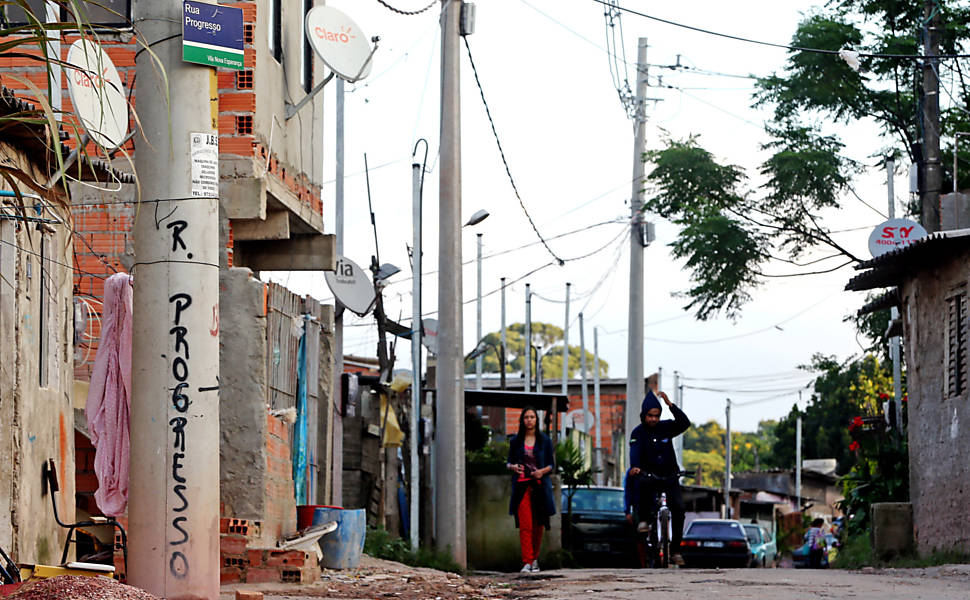Latest Photo Galleries
Brazilian Markets
11h53 Bovespa |
-0,36% | 124.284 |
16h43 Gold |
0,00% | 117 |
12h00 Dollar |
+0,43% | 5,1711 |
16h30 Euro |
+0,49% | 2,65250 |
ADVERTISING
Resident Is the Postwoman in Poor Neighbourhood of São Paulo with no Post Office and Sewage System
03/30/2015 - 14h25
Advertising
EMILIO SANT'ANNA
FROM SÃO PAULO
The light is there but to do justice to its name, the area still lacks the rest of the structure. Some things can wait, but having, at least, the address recognized by the post office would be a good start, say the residents of Progresso Street (progress in English).
The site at 20 km from Sé square has no asphalt, household waste collection, sewage nor easy access to public transportation. Instead, there is an entire slum trying to survive as they can.
The situation may not match the street name, but it fits like a glove for the community where it belongs: Vila Nova Esperança (New Hope Village, in English).
Located at the end of the West side of São Paulo, the reality of about 600 families - part of them live on the other side of the border, in Taboão da Serra (Greater SP) - is to believe that one day the public services will arrive there.
Without them, people improvise. In Vila Nova Esperança, the improvisation is called Lia, or Maria de Lourdes Andrade Silva, 52. "Check if there is a letter to your son. I know there is, but you need to look for it", says a neighbour, pointing to a cardboard box.
Lia is a trader, a community leader and an "amateur postwoman". That is how she divides her time. Living in Sao Paulo for more than twenty years, the lady from Bahia is an accurate portrait of the local population.
While talking to Folha, a postman passes by on a motorcycle. "That is the guy who delivers the mail only on Eiras Garcia Avenue. I asked the post office manager to deliver the rest in my grocery shop, so the residents do not need to go all the way there. At the market, people look for their mail themselves because I can't handle everything on my own", she says.
Although it exists since the mid 1960's, the address is not the only one that is not properly registered. Without knowing for sure if they will not be evicted, many residents still live in wooden shacks. "Sometimes, I think it should be called the Miracles Village", she says.
DISPUTED AREA
Since 2004, the State Prosecutor's Office brought a legal action against the occupation of the area. The agency claims the slum is in a preservation site and their stay jeopardizes the environment.
In 2010, a preliminary injunction decision ensured the permanence of the residents there. The area belongs to the Housing and Urban Development Company (CDHU), connected to São Paulo State government.
The situation is worsened because the favela is on the border between São Paulo and Taboão da Serra. "It is a pushing game between the municipalities", says Lia.
She says the mess is such that the electricity bill of all residents is sent with a zip code from São Paulo, although she estimates that half of the households belong to Taboão.
According to Eduardo Marques, professor at the Department of Political Science of University of São Paulo and researcher at the Centre for Studies on Metropolis, Vila Nova Esperança's reality reflects the model of urbanization adopted in Brazil until the 1970's.
He believes that since the country's re-democratization, in the 1980's, there was a process of expanding public services for the people of the peripheries. However, the resources were not enough for the "massive demand", he says.
Waiting for their demands to be met is not an alternative, says Lia. For example, while they demand waste bins to be installed, because there is no house to house collection, the residents have begun a community garden in the neighbourhood. In 2014, the project was awarded with the Milton Santos prize, given by the Municipal Chamber of São Paulo. It is a start to a place where there is still a lot to do.
"I cannot find it", says housemaid Lindalva Bastista, 50, not paying attention to this report, in response to Lia's information about her son's mail. "It terrifies me not receiving the bills and failing to pay them on time".
Translated by JULIANA CALDERARI




